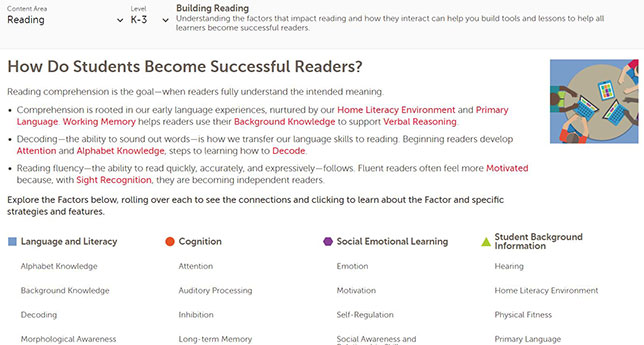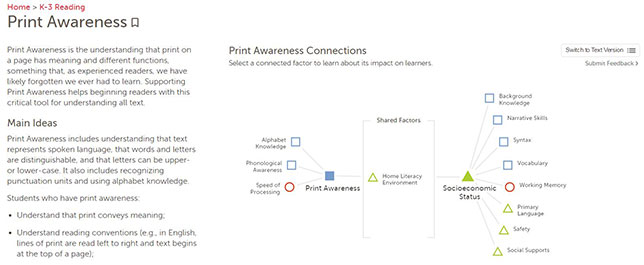Digital Promise Global Seeks Alpha Testers for Learner Positioning System
- By Dian Schaffhauser
- 05/24/17
Eight months after introducing the concept of the "learner positioning system" (LPS), Digital Promise Global has launched an alpha site to serve as a testing ground for this research-based personalized learning initiative. The organization, a non-profit that undertakes global learning initiatives, is affiliated with U.S.-focused Digital Promise.
The LPS is a free, open-source digital tool for supporting educators and product developers as they design and build curriculum, products and services to make learning personal. The first iteration specifically addresses reading for K-3. However, additional content is expected to be introduced for K-3 math in the fall. Following that will be reading in grades 4-6, 7-8 and 9-12 as well as math and numeracy in those grade levels.
The site uses a mind-mapping format to show connections and influence among four groups of learning factors: cognition, social emotional learning, student background and content. A text view lists each category and its specific topics. When the user rolls over an item, it displays the number of connections and highlights them in the listings as well. An alternative view shows the connections graphically.

Each item, such as auditory processing, verbal reasoning, motivation and social supports, has a dedicated page that explains the main ideas, provides strategies for addressing that learning area and suggests measures for assessing the student in that area.
For example, the topic of "motivation" falls under the "background knowledge" category. The "main ideas" discussion covers the "self-determination theory" at length and provides references from which the background was developed. The page includes 11 strategies, such as the use of "free play" in the classroom. By clicking on the "free play" tile from the strategy collection, the viewer is taken to a separate page that offers two videos, one for the teacher, showing how free play can be used in the classroom, and another for the ed tech producer, showing how an exemplar vendor has integrated the concepts of free play into its product line.

Because the site is in its early stage of development, Digital Promise Global has requested that users give feedback on a Survey Monkey form.
To gain access to the site, the user must enter an email address and use the case sensitive password, LPSalpha17.
About the Author
Dian Schaffhauser is a former senior contributing editor for 1105 Media's education publications THE Journal, Campus Technology and Spaces4Learning.